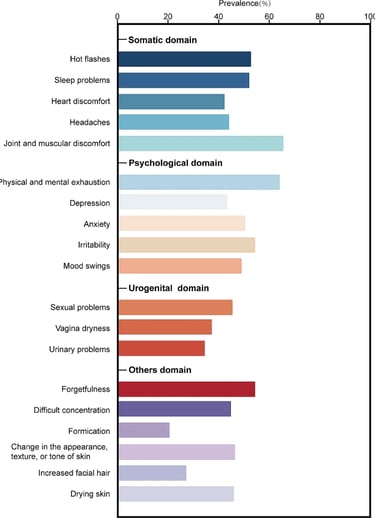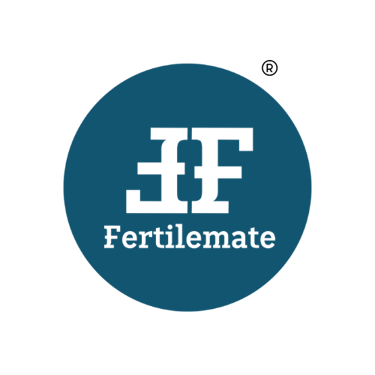Menopause Management with Feminira
Empower Your Hormones, Reclaim Your Life
Understanding Menopause in Malaysia
A study from the Klang Valley involving 258 postmenopausal women found that joint and muscle discomfort (73.3%) and fatigue (59.3%) were the most commonly reported symptoms. More than half of the women (52%) felt that menopause had an impact on their quality of life, though only a small percentage (2.7%) reported severe symptoms.


Prevalence of menopausal symptoms among middle-aged women
Menopause is a natural transition, but it can come with challenges like joint and muscle discomfort, fatigue, and changes that affect daily life. These symptoms are common but they don’t have to control your well-being.
With the right support, you can feel empowered, balanced, and in control of your health.
Struggling with Menopause Symptoms? Help Is Here.
Clinical Studies on Feminira Ingredients for Menopause
Ashwagandha (Withania somnifera) is a powerful adaptogen traditionally used to reduce stress and promote hormonal balance. It helps regulate cortisol levels, supports adrenal function, and improves the body's ability to manage chronic stress. For women with PCOS, Ashwagandha may assist in reducing symptoms like irregular cycles, anxiety, and elevated androgens triggered by stress.
Clinical Studies:
Ashwagandha
Pueraria Mirifica
Pueraria mirifica is a Thai medicinal plant rich in phytoestrogens, particularly miroestrol and deoxymiroestrol, which mimic estrogen in the body. For menopausal women, it may help relieve symptoms such as hot flashes, night sweats, vaginal dryness, and mood changes. By naturally supporting estrogen levels, Pueraria mirifica contributes to hormonal balance and improved quality of life during menopause.
Clinical Studies:
Saffron
Saffron (Crocus sativus) is a natural spice known for its mood-enhancing, antioxidant, and anti-inflammatory properties. For menopausal women, saffron may help ease symptoms like mood swings, irritability, anxiety, and sleep disturbances. It supports emotional well-being and may improve overall quality of life by modulating neurotransmitter levels, especially serotonin.
Clinical Studies:
Cinnamon
Cinnamon, derived from the bark of Cinnamomum trees, is a warming spice with powerful antioxidant and blood sugar-regulating properties. For menopausal women, cinnamon may help manage insulin resistance, reduce inflammation, and support heart health. It may also assist in easing menstrual irregularities during perimenopause and help stabilize mood and energy levels during hormonal shifts.
Clinical Studies:
Curcumin
Curcumin (from Curcuma longa) is the active compound in turmeric, widely recognized for its potent anti-inflammatory, antioxidant, and neuroprotective properties. For menopausal women, curcumin may help relieve symptoms such as hot flashes, joint pain, mood swings, anxiety, and cognitive changes. It supports hormonal balance and may enhance overall well-being by reducing oxidative stress and modulating inflammatory pathways.
Clinical Studies:
Amla
Amla, also known as Indian Gooseberry (Emblica officinalis), is rich in vitamin C and potent antioxidants. It supports weight loss by enhancing digestion, improving liver function, and reducing oxidative stress and inflammation. Amla may also help regulate blood sugar and lipid levels, contributing to better metabolic health and body weight control.
Clinical Studies:
Astaxanthin
Astaxanthin is a powerful carotenoid antioxidant derived from microalgae (Haematococcus pluvialis), known for its anti-inflammatory, skin-protective, and neuroprotective effects. In menopausal women, astaxanthin may help reduce oxidative stress, improve skin elasticity, support cardiovascular health, and alleviate symptoms like fatigue, mood swings, and cognitive decline. Its strong antioxidant capacity supports healthy aging and overall vitality during the menopausal transition.
Clinical Studies:
Marine Collagen
Marine collagen is a bioavailable form of collagen derived from fish, rich in type I collagen peptides that support skin, joint, and bone health. During menopause, the natural decline in estrogen leads to decreased collagen production, contributing to wrinkles, joint stiffness, and reduced skin elasticity. Supplementing with marine collagen may help improve skin hydration, reduce fine lines, support bone density, and ease joint discomfort, enhancing overall vitality and quality of life for menopausal women.
Clinical Studies:
CS Leaflabs Sdn Bhd (1342934-T)
Subscribe to our newsletter


4-1, Jalan Awan Makmur,
Taman OUG Square, 58200 Kuala Lumpur
Malaysia
